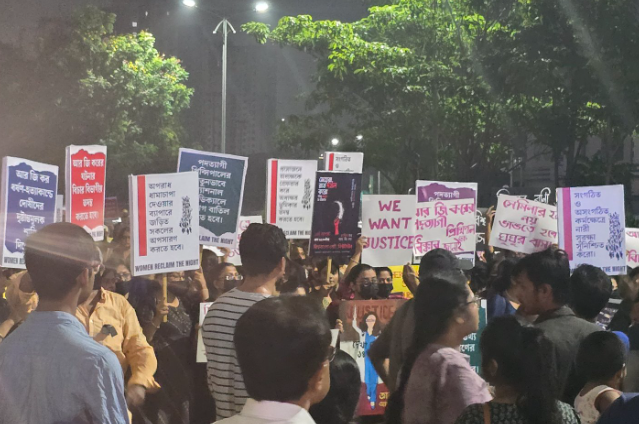AIIMS Delhi Leads the Charge
Dr. Kumar Kartikay, an AIIMS Delhi doctor had made it clear that they will not back down until they receive a written assurance that action will be taken in this matter. He stated, "We want to peacefully put forward our demands. We demand a Central Protection Act for healthcare workers. Until we get a written assurance, we will continue our strike. We are expecting around 3000-5000 people at Nirman Bhawan today from all the medical colleges in Delhi. We will not step back or sit quietly till we get an assurance that action will be taken."
AIIMS Mangalagiri Joins the Movement
Junior doctors and medical students at AIIMS Mangalagiri in Andhra Pradesh also staged a protest and performed a street play to condemn the rape and murder of a woman resident doctor at Kolkata's RG Kar Medical College and Hospital. Dr. Sreeja, a Senior Resident Doctor at AIIMS Mangalagiri had made a direct appeal to the CBI to conduct a transparent investigation into the incident.
Demands for Justice and Protection
Dr. Sreeja's statement highlighted the gravity of the situation by stating, "On the eve of Independence Day, protesting doctors at RG Kar faced mob attacks and also police attacks. The hospital was vandalised and evidence was erased. In condemnation of this, we are protesting here... It's not just a crime against doctors. It's a crime against women and humanity... We request the CBI to conduct a transparent investigation... The victim's family should receive adequate compensation... We also demand a Central Protection Act for all healthcare workers."
A Call for Change
The ongoing protests across the country demonstrate the urgent need for comprehensive measures to protect healthcare workers who dedicate their lives to serving the community. The demand for a Central Protection Act highlights the growing concern for the safety and well-being of those who work tirelessly to save lives.
Doctors at Chandigarh PGIMER Protest for Justice
Medical professionals at the Postgraduate Institute of Medical Education and Research (PGIMER) in Chandigarh have been staging a protest since Friday by demanding justice. The doctors have vowed to continue their demonstration until their grievances are addressed.
Patients Face Difficulties Due to Protest
Patients visiting the Chandigarh PGIMER during the protest have been facing significant challenges. Many have travelled long distances to seek medical attention only to find the Out-Patient Department (OPD) closed for the past five days. Patients have urged the government to fulfill the doctors' demands to alleviate their suffering. Nitin, a patient, expressed his frustration by saying, "We are facing a lot of problems due to the absence of OPD. We have come from a long distance."
Another patient, Pushpa, shared her experience, stating, "If the OPD is closed, then, we should have informed first. Now we have come. Our checkup was done on the old card but the card for meeting the new doctor is not being made, so we will have to come again." Gurpreet, a patient, voiced his concerns by saying, "We have been roaming around here since last night but no one is listening to us nor the doctors are attending to us. The government must listen to the doctors so that the strike gets over."
Resident Doctors in Amritsar Join the Protest
In a show of solidarity, the Resident Doctors Association of the Government Medical College in Amritsar, Punjab has announced the suspension of all non-essential and elective hospital services including Out-Patient Departments, Operating theatres and wards. This action will commence on August 16 and continue until further notice. The ongoing protest at Chandigarh PGIMER and the support from Amritsar's medical community highlight the importance of addressing the concerns of healthcare professionals. As patients continue to face difficulties due to the protest, the government must engage in constructive dialogue with the doctors to find a resolution that satisfies both parties and ensures uninterrupted medical services for the public.
Justice for the Victim
The primary demand of the protesting doctors is for justice regarding the rape and murder of a trainee doctor at RG Kar Medical College in Kolkata. They are calling for:
- A thorough investigation into the incident by specifically requesting a Central Bureau of Investigation (CBI) probe to ensure accountability and transparency.
- Severe punishment for the perpetrators involved in this heinous crime by emphasizing the need for justice not only for the victim but also as a deterrent for future incidents.
Enhanced Safety Measures
In light of the increasing violence against healthcare professionals, doctors are advocating for comprehensive safety measures, which include:
Implementation of a Central Protection Act that would classify violence against medical workers as a non-bailable offence by carrying significant penalties.
Increased security protocols within healthcare facilities, such as:
- Installation of CCTV cameras throughout hospital premises.
- Provision of more security personnel to ensure a safe working environment.
- Improved lighting in vulnerable areas of hospitals to enhance visibility and safety, particularly for female staff.
Immediate Action and Accountability
The protesting doctors are also demanding immediate action from hospital authorities and the government, which includes:
- Resignation of responsible officials who failed to protect staff and attempted to downplay the gravity of the incident.
- Implementation of emergency response systems including apps for quick reporting of incidents and immediate redressal of any violence or harassment faced by medical personnel.
The demands of the doctors at PGIMER are not only a response to a singular tragic event but also reflect a broader call for systemic change within the healthcare system. Their protest highlights the urgent need for reforms that prioritize the safety and well-being of medical professionals by ensuring that they can perform their duties without fear of violence or harassment.
. . .
References:

